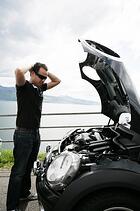Car companies recall certain makes, models, or even a single part on one of their vehicles when a safety concern is discovered. Recalls are more common than most people realize, as even the smallest safety problem immediately triggers a recall of some kind. When you receive a letter stating that your car, in full or in part, has been recalled by the manufacturer, there are ways you can make dealing with the process easier. 
Be Proactive
Start dealing with a recall of your car as soon as possible once you are notified. A recall means that your car is potentially not safe for driving and is in need of replacement or repair. No matter how inconvenient or irritating a sudden trip to the car dealership may seem, it is much better than the consequences of driving a defective vehicle. A recalled car that is not repaired is unsafe to drive and it is nearly impossible to sell your car to someone else.
The Repair
As long as you go to the dealership’s in-house or approved auto body and repair facility and provide the recall notice you received, you should not be charged for the required repairs. You cannot take your car to your favorite independent mechanic for a recall repair. Call the local dealership for your car’s make and ask to schedule an appointment to have the work done.
Stay Organized
When you sell a used car that has undergone a recall repair, you need to have proof the auto repair was done. If you don’t, the buyer can seek a refund and further compensation if anything related to the recalled part goes wrong with the car later. The resale value of a recalled car with no proof of repair is also substantially lower than a recalled car with that proof. Stay organized and keep every piece of documentation you are given on the recall, the repair, and other maintenance information.
Be Aware
Some car companies are slower than others when it comes to sending out recall letters. Once a recall is announced, it could take months for you to receive a letter stating that your car was affected. As soon as you hear about a recall that might include your vehicle, contact the manufacturer and keep contacting them until you are satisfied with the information you receive.
A car is recalled when a safety issue is discovered that could make it dangerous to drive. Take immediate action when your car is recalled so you can get the needed repairs and resume safe driving.
*Image courtesy of freedigitalphotos.net




